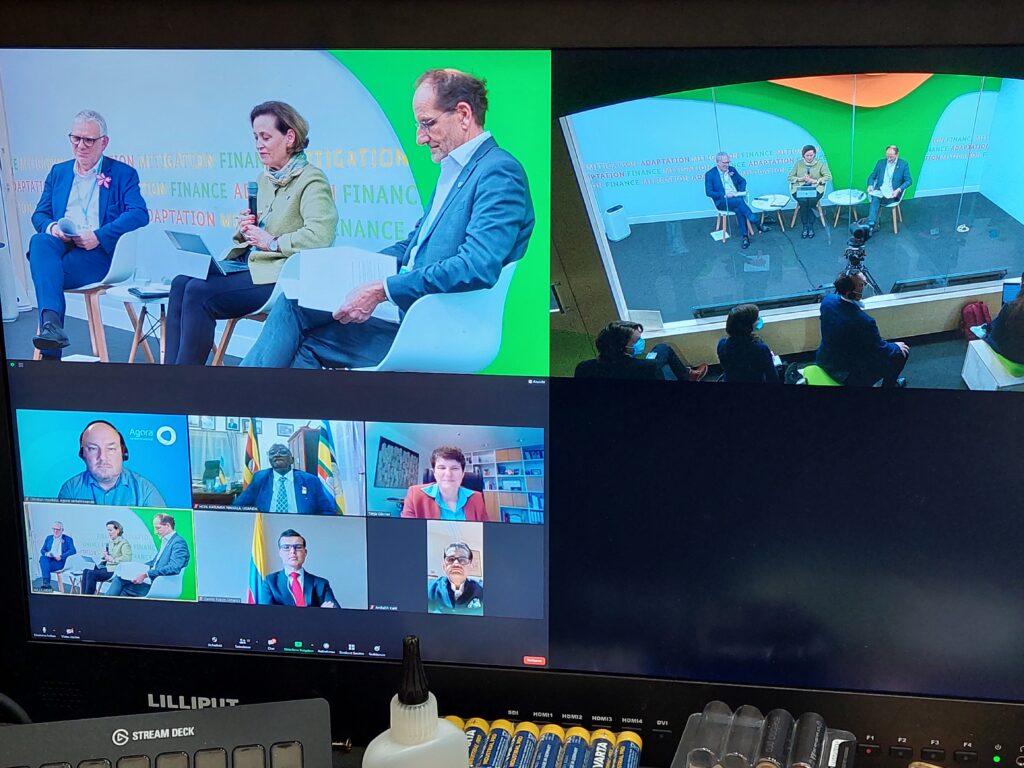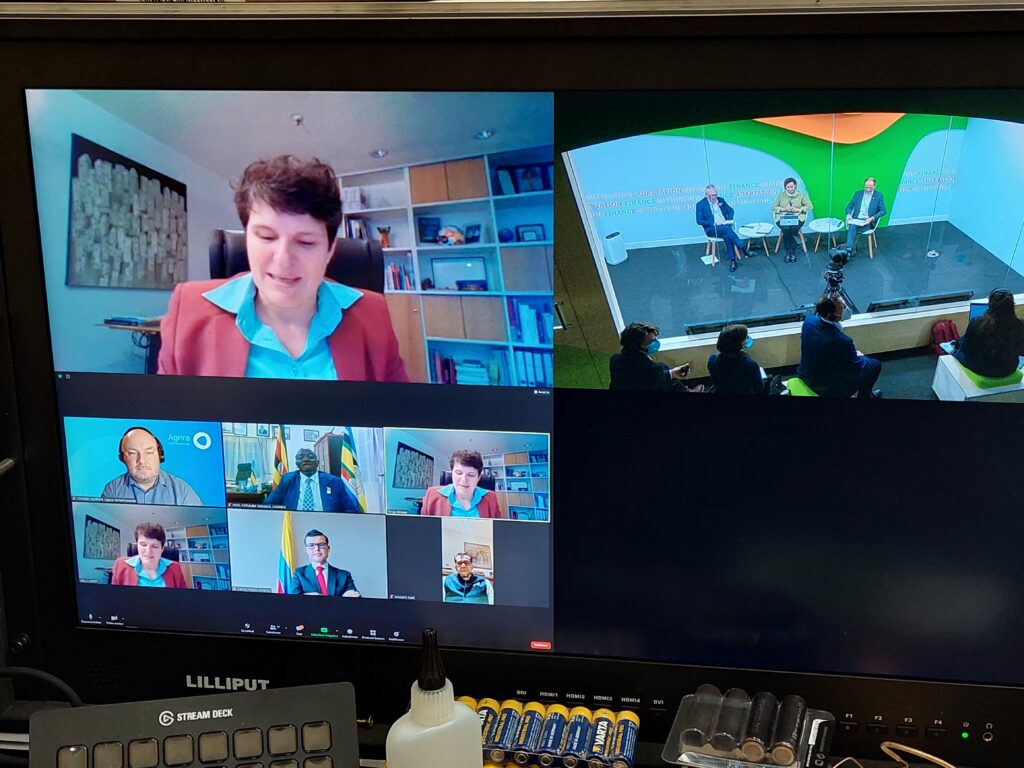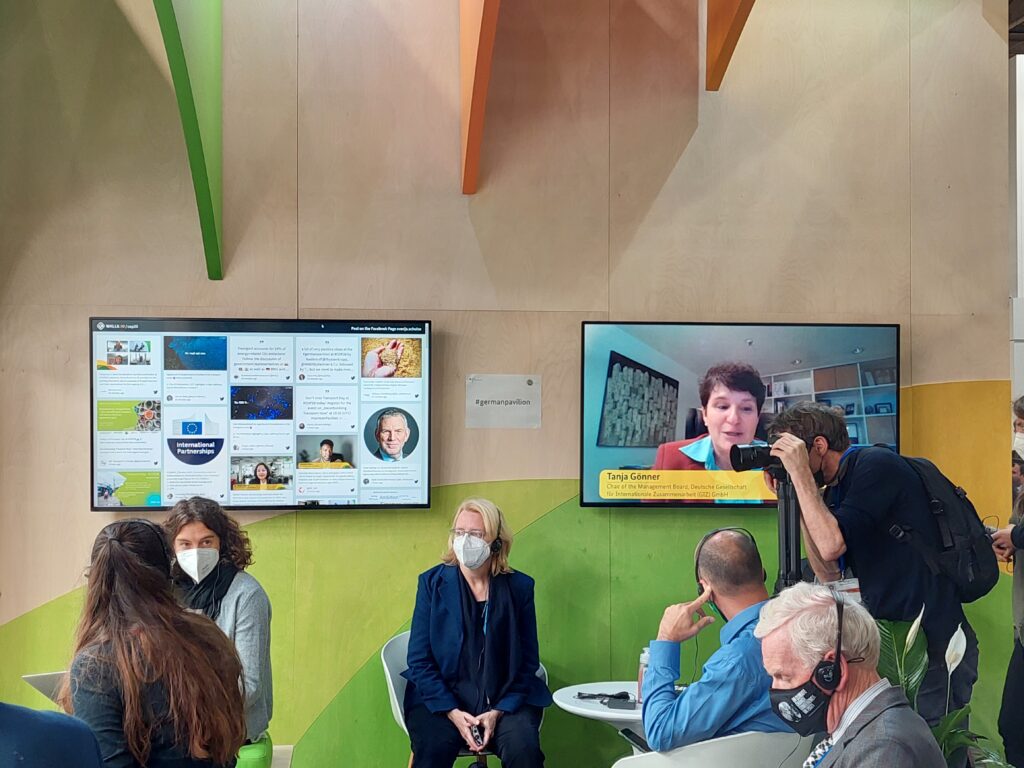
After two weeks of negotiations and milestones for global climate action, the 26th summit of the United Nations Framework Convention on Climate Change (COP26) ended on Saturday, 13 November.
The results of the negotiations and the achievement of the summit’s objectives have not been entirely encouraging, leaving a series of challenges for climate action and a clear message: We must act now.
In addition to the negotiations, the COP also brings together various actors involved in climate action, a space for discussion, exchange, and joint learning to advance the implementation of measures that will make the necessary transformations towards zero carbon transport a reality.
This year’s COP26 side events programme was extensive including the transport sector. On Transport Day on November 10 more than 50 events of various countries, international organisations, business and NGOs happened in the various pavilions and meeting spaces.
GIZ and its partners actively participated in eleven events, and we want to report back some highlights from those:





The event, organised by the European Investment Bank with support from GIZ, highlighted the relevance of low-carbon infrastructure development in Indonesia, showcased the cooperation between Germany, Indonesia and the EIB. It provided expertise on linking cities to finance from Metropolitan Makassar and Batam City, who’s Bus Rapid Transit (BRT) development is currently supported by FELICITY and in cooperation with SUTRI NAMA & INDOBUS.
The high-level dialogue was attended by the BMU, EIB, GIZ, Bappenas, EU Delegation to Indonesia, Governor of Sulawesi South Province and the Mayors of Makassar and Batam.
During the event the Ministry of National Development Planning of Indonesia (Bappenas) emphasized its readiness to support the implementation of the currently supported projects by FELICITY. Since Indonesia is committed to achieve net-zero emissions by 2060, joint cooperation is necessary to tackle climate change and its impacts. Hence, Indonesia is a key partner for Germany to successfully address climate change mitigation. Moreover, the EIB will act under the Team Europe Approach promoting green climate action and green transformation in Indonesia through direct lending, since the potential to prepare and finance low-carbon infrastructure in Indonesia is examined by the panellists to be huge.
The shipping sector contributes a significant amount of the global greenhouse gas emission – if this sector was a country, it would be #8 in terms of emitting carbon.
Clarence Samuel Director for the Climate Change Directorate the Ministry of Environment, The Marshall Islands
The Republic of Marshall Islands (RMI) is the only country worldwide to explicitly include domestic shipping in its NDCs, setting ambitious goals to reduce emissions from its domestic shipping sector by 40% by 2030 and achieve full decarbonization of the sector by 2050. RMI is well on its way to building a climate-friendly and energy-efficient future. This session aimed to share the Marshallese communities’ experiences, how they are empowered to build resilience, and the skills they need to move forward into a sustainable and prosperous future. The key messages of the session are the significance of ancestral knowledge. Thus rediscovering this heritage connects us to our roots and leads the path to a sustainable future. And how the Marshall Islands, despite their nil carbon emission, has taken a giant leap forward that many others need to take and set very ambitious goals in their Nationally Determined Contributions. An important example for bigger nations. The event was organised by the GIZ Low-Carbon Sea Transport Marshall Islands project together with the Delegation of the Republic of the Marshall Islands (Climate Change Directorate) and their project partner Waan Aelōn̄ in Majel (WAM).
This sector is extremely reluctant in change and slow in transformation. If you hesitate to implement tools and measures, it will be hard in the coming years.
Jochen Flasbarth, Federal Ministry of the Environment, Nature Conservation and Nuclear Safety (BMU), Germany
Sectoral policies need to be connected to national and international climate commitments to enforce the decarbonisation of transport. Participants pointed to the importance of the support from international initiatives. International learning can help, countries to leapfrog in the transport sector with numerous measures for a clean, shared, connected, and zero-emission transformation, avoiding the errors of the past.
The high-level event with Ministers from Colombia, India and Uganda, organised by The Federal Ministry of the Environment, Nature Conservation and Nuclear Safety (BMU) and the Federal Ministry for Economic Cooperation and Development (BMZ), with support from GIZ, addressed the urgency and relevance of climate action in the transport sector.
During the event, a new study of the University of Technology in Sydney was released by the Transformative Urban Mobility Initiative. It describes a 1.5°C pathway for transport assuming carbon budget of 110 Gt CO2eq for the sector within the next 30 years (based on an overall remaining carbon budget of 400 Gt CO2eq as per the 6th IPCC Assessment Report assuming a 67 % likelihood of limiting global warming to).
It is not about choosing the best vehicle, is about choosing the best design.
Adriana Lobo, WRI
This event was focused on the transformation of public transport and what is needed to advance in its electrification. Some of the key outcomes from the session are that Colombia and Chile are leading the way on electrification, which has generated different business models to make it feasible and applicable to Latin American cities. Nonetheless, financial resources and dedicated policy goals are still needed. In this regard, the key issue now to achieve large-scale electrification is how to make it work for smaller cities with more dispersed fleets.
The event was organised by the Colombian Ministry of Transportation and the Colombian Government, with the participation of GIZ Transport Advisors.
We need a shift in perspective and not see adaptation as a “climate” or “environmental” issue but consider climate risk as an economic, safety and social risk to be considered in transport planning and operations.
Urda Eichhorst, Senior Project Director, GIZ
Climate impacts are severely affecting cities and their transport systems, causing millions of dollars in damages and threatening lives and livelihoods. Davinah M. Uwella, Principal Programme Director of African Development Bank, noted that there’s a large need to de-risk investments in least developed countries, because at the moment, many of the countries most affected by the impacts of climate change struggle to tap existing funds for adaptation. On the positive side, analysis of countries’ NDCs showed that many more countries included adaptation in the transport sector in their updated NDCs (41% compared to 22%), reflecting the growing attention to the topic. To better support countries in their efforts to become climate resilient, donors should set up large-scale capacity development initiatives to raise awareness and train transport policy makers and planners at national and local level in climate risk management.
The event was organised by the Islamic Development Bank (IsDB).
Watch the event again here
For the success of our national urban mobility strategy, the transport sector is not isolated, but is coordinated with energy, economy, transport, environment, integrating different aspects and visions that enrich the process.
Paola Visca, Ministerio de Vvienda y Ordenamiento Territorial de Uruguay
The event sought to share experiences and good practices from the public, private, and civil society sectors from Latin American countries, towards sustainable mobility at the local level. Some highlighted lessons from the session are the relevance of coordinating the different areas from the public sector to include their vision into the design and implementation of sustainable mobility plans. The importance of the involvement of the private sector in the achievement of the NDCs. And how local experiences can provide lessons to be scaled-up to a national perspective.
Watch the event again here.
The event was organised by EUROCLIMA+, GIZ, Sustentar – LEDS LAC, SLOCAT, GIZ, UNEP.
The call to action for change in our sector demands progress to make transport accessible to people and align to global goals of emissions reduction, resilience, and adaptation to climate change.
Carolina Simonetti, Chief of Advisors, Ministry of Transports and Telecommunications of Chile
The event was focused on multi-level cooperation to implement the transport aspects of Nationally Determined Contributions (NDCs) at all levels of governance. Organised by EUROCLIMA+, GIZ (NDC-TIA, TraCS, Moving Chile), and MobiliseYourCity, the discussion included experiences from Latin America and Africa that showed how the cooperation within different actors strengthened the implementation of strategies and sustainable mobility plans. The main messages from the session are the importance of the collaboration of international initiatives to enhance climate action in the sector and the multiple tools and platforms available to support countries in implementing these actions.
Also, during this event, the new publication “Aumento de ambición climática en el sector transporte. Buenas prácticas, lecciones aprendidas y recomendaciones desde América Latina” was presented, highlighting the relevance of peer learning at the regional level.
Finally, the event also highlighted the Zero Mobility Emissions Commitment presented by the High-level Champion of COP25, Gonzalo Muñoz, and the leader cities that already joined the call: Cuenca (Ecuador), Bogotá (Colombia), and Salvador (Brasil).
Watch the event here.
